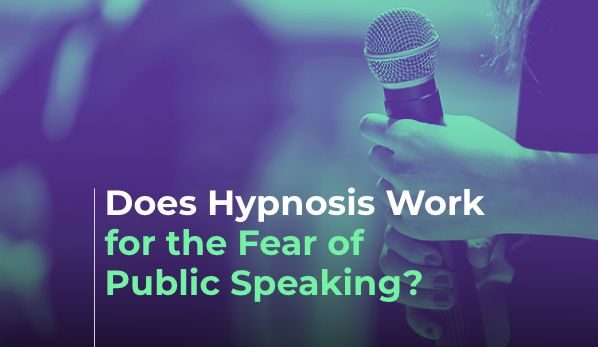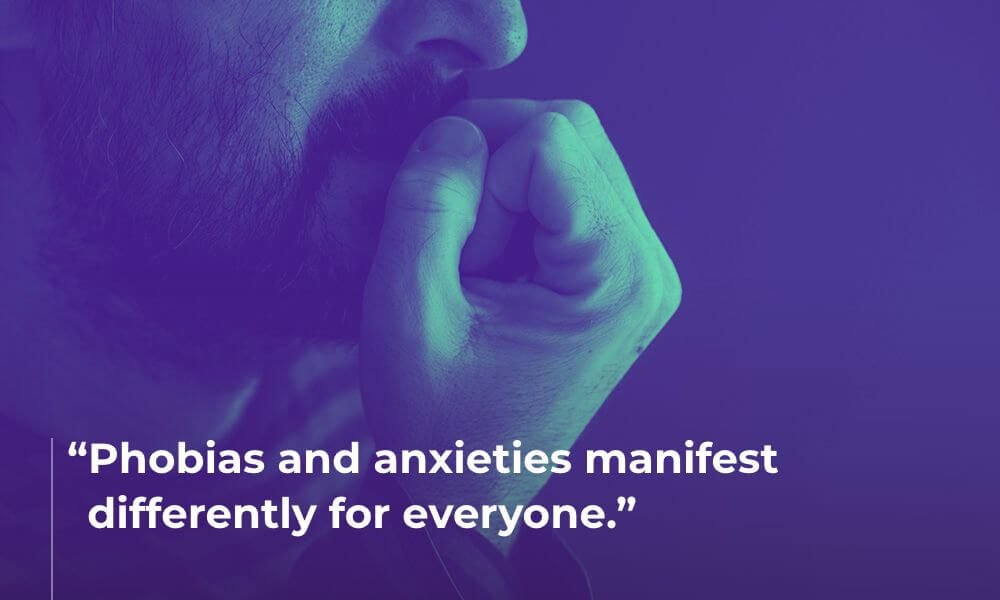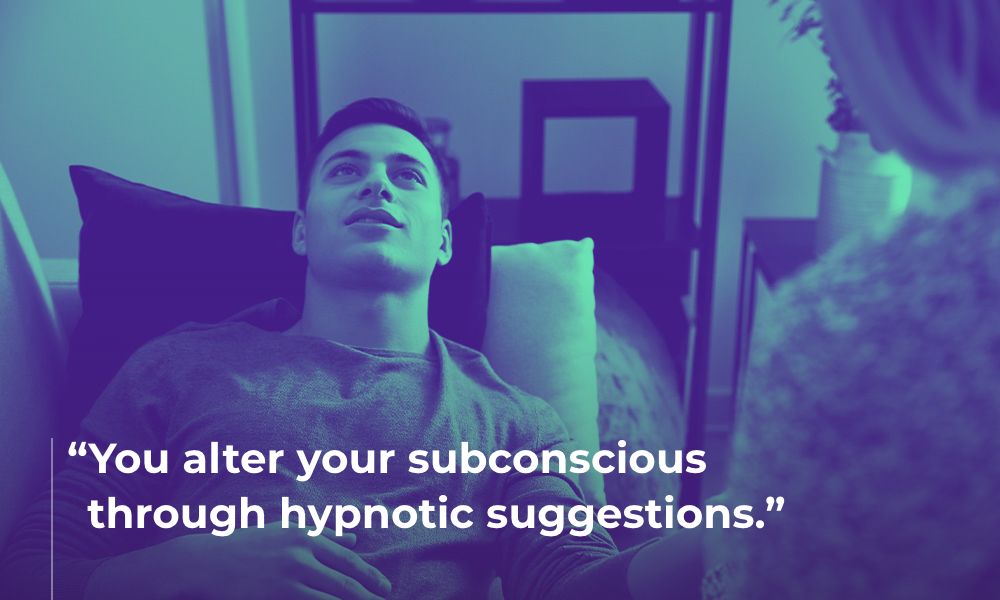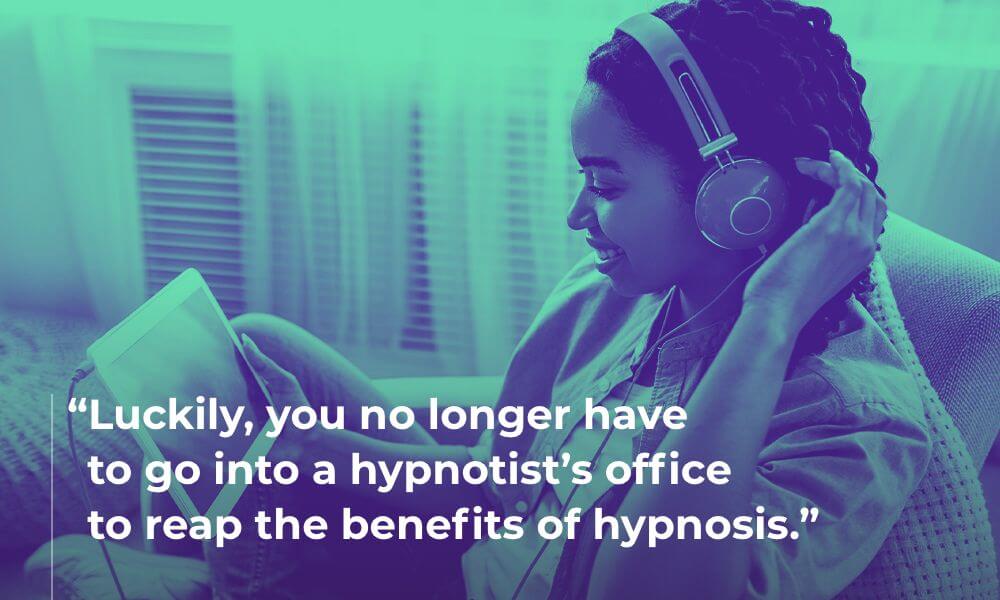Hypnosis can help you overcome your fear of public speaking by identifying and eradicating the underlying beliefs that trigger your fear.
In this article, we explore the fear of public speaking, also known as glossophobia. We discuss what causes it and how hypnosis can help combat it. We also explain how hypnosis for public speaking works, and we share tips for helping you speak confidently. Plus, we let you in on our best trick for conquering your public speaking fear starting today.
Glossophobia: the Fear of Public Speaking
Public speaking can be scary. It’s normal to feel nervous, whether you’re presenting to a room full of colleagues or speaking to an audience filled with hundreds of people. Regardless of your public speaking forum, glossophobia can manifest in some uncomfortable ways.
Sweaty palms, a pounding heart, butterflies in your stomach, and a constricted feeling in your throat—these are just a few of glossophobia’s many symptoms. If you’ve experienced any undesirable symptoms before speaking publicly, you may have some form of glossophobia.
If you have a fear of public speaking, you’re in the majority. Glossophobia is one of the most common fears. A whopping 77% of the population counts speaking publicly as one of their fears.
Some people can get away with minimal public speaking, and for these people, this fear stays under wraps. However, other folks need to speak publicly in order to succeed in their chosen profession.
If your career requires a lot of public speaking, there is hope. The fear of public speaking can go away with the right help.
What Causes a Fear of Public Speaking?
There are many “surface level” reasons that may cause you to fear being in the spotlight. One of the most common is that you’re simply afraid of people judging you. You may also feel unprepared to speak (even if you prepared a lot), or perhaps you feel that your presentation isn’t good enough. Similarly, you may compare yourself to other speakers, worry about looking silly, or have a fear of rejection.
We call these fears “surface level” because they’re typically symptomatic of something much deeper. They may link to deeply-rooted beliefs about your worth or importance. Or, you may have strongly-held memories from a time you were judged, which can influence your confidence speaking in the present.
You may not be aware of these beliefs or memories. But even if you’re not aware of them, they can still affect you and your speaking abilities. In fact, most of our motivations, fears, and actions come from factors we’re not aware of. These notions are rooted in the subconscious mind, which influences most of our behavior.
What are the Common Symptoms?
If you’re experiencing the fear of public speaking, you may have symptoms before, during, and even after your speaking session like:
- Nausea, vomiting, or upset stomach
- High blood pressure
- Rapid heartbeat
- A flight response (e.g. a desire to run away)
- A freeze response (e.g. an inability to continue on with the presentation)
- Tight muscles
- Sweating
- Uncontrollable shaking
- Dry mouth
- Uncomfortable physical sensations, like tingling in the arms and legs
- Panic attacks
- Feeling short of breath
- Feeling butterflies in your stomach or chest
This is not an inclusive list of symptoms. Phobias and anxieties manifest differently for everyone. So, if you experience any uncomfortable symptoms before, during, or after public speaking, it may be a fear response and a sign that you have glossophobia.
Fear, Phobias, and the Mind
It’s estimated that about 19 million people in the United States alone have a phobia.
There can be multiple and complex causes of phobias. A phobia can come from genetics, a negative experience, or you may have “inherited” an irrational fear that your caretaker had when you were growing up. For many people, phobias result from a combination of memories and beliefs stored in the subconscious mind.
It’s also known that people who have phobias tend to fixate on the negative, and they may have a distorted view of reality. Both of these combine to mean that they believe their fear is more likely to come true than it actually is.
It’s common for children to have phobias (like a fear of the dark), and it’s also common for children to grow out of these fears. However, if you reach adulthood with a phobia, you’ll likely need some help to resolve the fear. This help can come in many forms, like cognitive behavioral therapy, exposure therapy, or hypnosis.
How Hypnosis Can Help with Fear of Public Speaking
Hypnosis is an effective, non-invasive way to address the fear of public speaking. It works by helping you identify and then remove the subconscious beliefs and memories that motivate your glossophobia.
The best news is that hypnosis often works quickly, even in as little as two sessions. Plus, studies indicate that hypnosis for phobias is even more effective as a complement to behavioral therapy.
Hypnosis is also proven to be effective in reducing generalized anxiety disorder (GAD) symptoms. GAD is a disorder that often goes hand-in-hand with phobias.
You may even know of some people who have used hypnosis to overcome their fear of public speaking. If not your neighbor, colleague, or CEO, there’s also Princess Diana, Bruce Willis, and James Earl Jones—all three overcame their public speaking fears using hypnotherapy.
How Hypnosis for Public Speaking Works
In order to understand how hypnosis works for public speaking, let’s first review the functions of your conscious and subconscious mind.
Your conscious mind is the part of your mind you’re aware of using every day—it’s the rational mind that generates your conscious thoughts. And though it may seem like your conscious mind is running the show, that’s not the case. Instead, that honor goes to your subconscious mind.
Sometimes referred to as your unconscious mind, the subconscious is the part you’re not aware of in your day-to-day life. Yet, your subconscious mind stores every belief and memory you’ve ever had. It uses this stored information to guide all of your current decisions, actions, and, yes, even your phobias.
So, in order to tackle your fear of public speaking at the source, you need to access your subconscious mind. Hypnosis is the best way to do that. A hypnotist uses relaxation techniques to guide you into a hypnotic trance. When you’re in this trance-like state, your conscious mind is no longer “guarding” your subconscious mind.
This allows you to directly access and alter your subconscious for the better. You alter your subconscious through hypnotic suggestions. These suggestions help uproot the fears, memories, and beliefs that contribute to the problem. When the hypnosis is over, you feel ready to conquer public speaking.
(If you’re interested in an in-depth look at this process, head over to our article on hypnosis for fear.)
What Else Helps With the Fear of Public Speaking?
Because the fear of public speaking can be complex, it’s best to approach the problem from multiple different angles. So if you’d like to supplement your hypnosis practice with other methods for combatting glossophobia, we recommend the following:
- Cognitive behavioral therapy. Cognitive behavioral therapy (CBT) can be an excellent adjunct to hypnosis for making any kind of behavioral change, including addressing a fear like glossophobia. Studies indicate that hypnosis and CBT make an excellent, effective pair.
- Practice your presentation. At the risk of sounding like a speech teacher, we do recommend that you practice speaking as much as you can. The better you know your material and the more comfortable you get with the presentation, the less fearful you will be.
- Visualize your success. Visualization is a powerful tool to help you get what you want. In fact, Olympic athletes like Michael Phelps and Brittany Bowe use visualization as part of their success. Start visualizing yourself presenting confidently and be specific with the details. This will help you feel more confident when the big day comes.
- Meditate. Meditation improves most things, and phobias are certainly one of them. By helping you develop self-awareness and the ability to put space between your thoughts and actions, meditation can help immensely in overcoming the fear of public speaking.
- Guided Hypnosis Audios: If you’re not able to work directly with a hypnosis coach, or you want an extra boost before you “step on stage,” try using a guided hypnosis audio focused on public speaking. These audios are designed to generate the right mindset that you need to overcome your fear of public speaking, and give a talk that wows everyone listening.
Building the Confidence to Speak in Public with Primed Mind
If you’re facing down a fear of public speaking, first things first: give yourself a pat on the back. The fear of public speaking is so common, and most people give in to it by simply choosing avoidance. So, if you’re proceeding with becoming a confident public speaker despite your fear, you’re already ahead of the game.
Hypnosis is one of the most powerful ways to make positive changes in your life, whether it be eliminating your fear of public speaking, becoming more confident, or making any number of positive changes you know you need to make.
They simplest way to get started with hypnosis is to download the Primed Mind a mindset and hypnosis app designed by one of the world’s foremost mindset coaches. Primed Mind includes dozens of hypnosis audio Primers focused on helping you achieve your goals and unlocking the best version of yourself..
The Primed mind library includes over 300 Primers with opics like mastering public speaking, overcoming insecurities, and dealing with anxiety. Download Primed Mind now to start your life-changing hypnosis sessions and become comfortable talking in front of other people today. We’ll see you on the stage!




